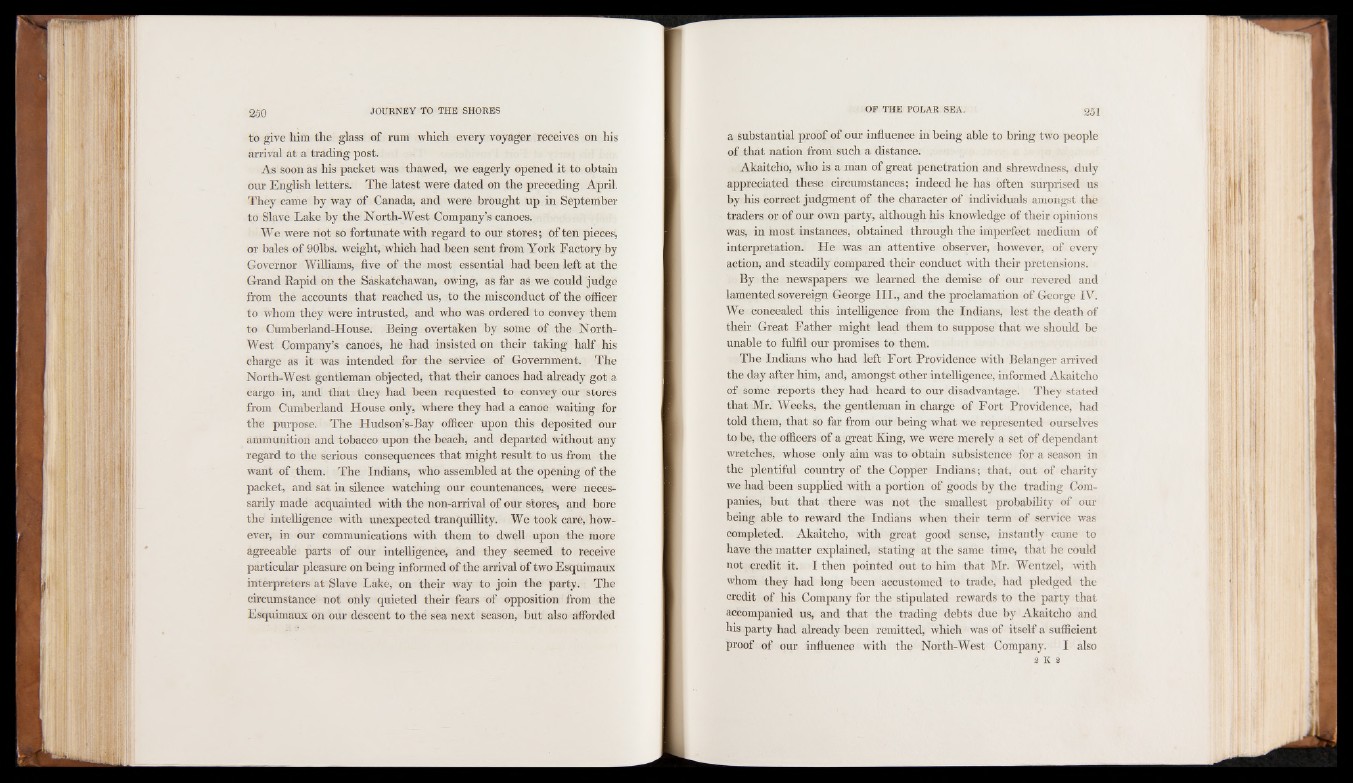
to give him the glass of mm which every voyager receives on his
arrival at a trading post.
As soon as his packet was thawed, we eagerly opened it to obtain
our English letters. The latest were dated on the preceding April.
They came by way of Canada, and were brought up in September
to Slave Lake by the North-West Company’s canoes.
We were not so fortunate with regard to our stores; of ten pieces,
or bales of 90lbs. weight, which had been sent from York Factory by
Governor Williams, five of the most essential had been left at the
Grand Rapid on the Saskatchawan, owing, as far as we could judge
from the accounts that reached us, to the misconduct of the officer
to whom they were intrusted, and who was ordered to convey them
to Cumberland-House. Being overtaken by some of the North-
West Company’s canoes, he had insisted on their taking half his
charge as it was intended for the service of Government. The
North-West gentleman objected, that their canoes had already got a
cargo in, and that they had been requested to convey our stores
from Cumberland House only, where they had a canoe waiting for
the purpose. The Hudson’s-Bay officer upon this deposited our
ammunition and tobacco upon the beach, and departed without any
regard to the serious consequences that might result to us from the
want of them. The Indians, who assembled at the opening of the
packet, and sat in silence watching our countenances, were necessarily
made acquainted with the non-arrival of our stores, and bore
the intelligence with unexpected tranquillity. We took care, however,
in our communications with them to dwell upon the more
agreeable parts of our intelligence, and they seemed to receive
particular pleasure on being informed of the arrival of two Esquimaux
interpreters at Slave Lake, on their way to join the party. The
circumstance not only quieted their fears of opposition from the
Esquimaux on our descent to the sea next season, but also afforded
a substantial proof of our influence in being able to bring two people
of that nation from such a distance.
Akaitcho, who is a man of great penetration and shrewdness, duly
appreciated these circumstances; indeed he has often surprised us
by his correct judgment of the character of individuals amongst the
traders or of our own party, although his knowledge of their opinions
was, in most instances, obtained through the imperfect medium of
interpretation. He was an attentive observer, however, of every
action, and steadily compared their conduct with their pretensions.
By the newspapers we learned the demise of our revered and
lamented sovereign George III., and the proclamation of George IV.
We concealed this intelligence from the Indians, lest the death of
their Great Father might lead them to suppose that we should be
unable to fulfil our promises to them.
The Indians who had left Fort Providence with Belanger arrived
the day after him, and, amongst other intelligence, informed Akaitcho
of some reports they had heard to our disadvantage. They stated
that Mr. Weeks, the gentleman in charge of Fort Providence, had
told them, that so far from our being what we represented ourselves
to be, the officers of a great King, we were merely a set of dependant
wretches, whose only aim was to obtain subsistence for a season in
the plentiful country of the Copper Indians; that, out of charity
we had been supplied with a portion of goods by the trading Companies,
but that there was not the smallest probability of our
being able to reward the Indians when their term of service was
completed. Akaitcho, with great good sense, instantly came to
have the matter explained, stating at the same time, that he could
not credit it. I then pointed out to him that Mr. Wentzel, with
whom they had long been accustomed to trade, had pledged the
credit of his Company for the stipulated rewards to the party that
accompanied us, and that the trading debts due by Akaitcho and
his party had already been remitted, which was of itself a sufficient
proof of our influence with the North-West Company. I also
i K S